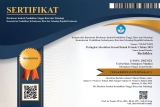Dissecting the Position of Living Law in the Criminal Code 2023
Abstract
This study analyzes the position of living law in the 2023 Criminal Code. Through normative research methods using a legislative approach and a conceptual approach, this article finds: First, the position of living law in the 2023 Criminal Code is narrowed down to only referring to customary law as regulated in the explanation of Article 2. Second, the regulation of customary law is a recognition of sanctions for fulfilling customary obligations that will be used by judges as guidelines for sentencing. Third, the living law sanction in the 2023 Criminal Code is a type of additional criminal sanction in the form of fulfilling local customary obligations. Violations of the provisions of living law are subject to principal criminal sanctions and additional criminal sanctions if the act has been regulated by the 2023 Criminal Code. The regulation of additional criminal sanctions in the form of customary obligations aims to accommodate the types of customary law sanctions. In addition, there is a substitution mechanism for perpetrators who cannot fulfill customary obligations, in the form of substitution of compensation whose value is equivalent to a category II fine to a supervision sentence or social work sentence.
Keywords
Full Text:
PDFReferences
Book
Arief, Barda Nawawi. Potpourri Criminal Law Policy: Development of the Drafting of the New Criminal Code Concept. Print to. Jakarta: Kencana Prenadamedia Group, 2015.
Arifin, K. K., & Primadianti, H. "Reviewing the Legal Implications of Life as an Extension of the Principle of Legality in the Criminal Code." Sriwijaya Crime and Legal Studies 1, no. 1 (2023): 44–55.https://doi.org/10.28946/scls.v1i1.2732.
National Development Planning Agency. Indigenous Peoples in Indonesia: Towards Inclusive Social Protection. National Development Planning/Bappenas Ministry, 2013. https://perpustakaan.bappenas.go.id/e-library/file_upload/koleksi/migrasi-data-publikasi/file/Policy_Paper/Masyarakat_Adat_di_Indonesia-Menuju_Perlindungan_Sosial_yang_Inklusif.pdf.
Bushar, Muhammad. Principles of Customary Law. Jakarta: Balai Pustaka, 2013.
Camargo, Camilla De. "'We are guinea pigs': Police uncertainty enforcing coronavirus regulations in the UK." International Journal of Law, Crime and Justice 72, no. November 2022 (2023): 100566. https://doi.org/10.1016/j.ijlcj.2022.100566.
Chandranegara, Ibnu Sina, Gusta Orin Andini, and Nani Mulyati. "Women in the Vortex of Law & Customs: An Emergency Reflection on Sexual Violence in Indonesia." In Indonesian Law in the Future, edited by Ibn Sina Chandranegara, 1st edition, 356. Jakarta: Rajagrafindo Persada, 2022. https://ebooks.gramedia.com/id/buku/hukum-indonesia-di-masa-depan.
Christinawati, Ayu Denis. "Living Law in the Indonesian Criminal Code: Customary Law Perspective and Its Impact on Law Enforcement." Civic: Journal of Law and Civic Education Studies 3, no. 1 (2024): 87–97.
Ehrlich, Eugen. Basic Principles of Legal Sociology. Walter L. Moll trans: Walter L. Moll trans, 1936.
Gani, Andika Wahyudi. "The Existence of Siri' na pacce Cultural Values on the Crime of Murder Based on the Origin of Legality in the Bugis-Makassar Community." Dissertation. Gadjah Mada University, 2019.
Hadi, Syofyan. "POSITIVE LAW AND LAW OF LIFE (Existence and Applicability in Society)." DiH Journal of Law 13, no. 26 (2017): 259–66. https://doi.org/1 10.5281/zenodo.1239838.
Hadziq, Sahran. "The regulation of the crime of adultery in the Criminal Code is studied from the perspective of living law." Journal of Lex Renaissance 4, no. 1 (2019): 25–45. https://doi.org/10.20885/jlr.vol4.iss1.art2.
Judge, Muh Ridha. "The implementation of rechtsvinding with the characteristics of progressive law." Journal of Law and Justice 5, no. 2 (2016): 227. https://doi.org/10.25216/jhp.5.2.2016.227-248.
Hiariej, Eddy O.S. Principles of Criminal Law Adjustment Edition of the National Criminal Code. i. Jakarta: Rajawali Press, 2024.
Irianto, Sulistyowati. "Living Law in the Draft Criminal Law." Jakarta, 2023. https://bphn.go.id/data/documents/materi_cle_8_yg_ke-2prof_dr_sulistyowati_irianto.pdf.
Irmawanti, Noveria Devy, and Barda Nawawi Arief. "Urgency of Criminal Objectives and Guidelines in the Context of Reform of the Criminal Law Criminal System." Journal of Indonesian Legal Development 3, no. 2 (2021): 217–27. https://doi.org/10.14710/jphi.v3i2.217-227.
Irwansyah. Legal Research: Choice of Article Writing Methods & Practices. Edited by Ahsan Yunus. 1st Edition Vol. 1. Yogyakarta: Mitra Buana Media, 2020.
Kurniawan, Itok Dwi, Law Study Program, Sebelas Maret University, Article Info, Principles of Legality, Life Law, and Criminal Law. "Analysis of the Existence of Living Law in Updating the Principle of Criminal Law Legality" 2, no. 1 (2024): 100–104.
Kurniawan, Itok Dwi, and Vincentius Patria Setyawan. "ANALYSIS OF THE INTEGRATION OF LIVING LAW IN INDONESIAN." Journal of Ajah 22, no. 1 (2022): 409–14.
Lathif, Nazaruddin, Khansa Kamilah Roza Irawan, Dona Putri Purwinarto, Syarifah Faizah, and Rivan Mandala Putra. "Policy Reform for Handling Sexual Violence Crimes According to the Tpks Law to Achieve a Madani Indonesian Society." PALAR (Pakuan Legal Review) 8, no. 4 (2022): 91–105. https://doi.org/https://doi.org/10.33751/palar.v8i4.
Lopez, Carles Gorris. "INTERPRETATION OF NE BIS IN IDEM IN CASE LAW AND THE EFFECTIVENESS OF EUROPEAN COMPETITION LAW." Revista Catalana De Dret Public 68, no. 2 (2024): 31. https://doi.org/https://doi.org/10.58992/rcdp.i68.2024.4165.
Magala, Anugrah Sahtia. "Legal Accommodation Living in Indonesia's New Criminal Code According to the Perspective of Progressive Law." Spectrum of Law 20, no. 2 (2023): 115–27. https://doi.org/10.56444/sh.v20i2.4345.
Maria, Maria, Burhan Sidabaria, and Ellieka Sari. "The Impact of Living Law on Judges' Decisions in Civil Disputes in North Sumatra." Russian Journal of Law XI, no. 4 (2023): 536–44. https://doi.org/10.1017/Soo22216X09990575.
Marzuki, Peter Mahmud. Legal Research (Second Edition). Jakarta: Kencana Prenadamedia Group, 2006.
Muhaimin. Legal Research Methods. Mataram: Mataram University Press, 2020.
MULAHELA, T, A YANTO, and F HIKMAH. "Forging the Middle Way: The Problem of Integration of Living Law in Indonesian Criminal Reform." XII Russian Journal of Law, no. 1 (2024): 138–50. https://russianlawjournal.org/index.php/journal/article/view/3632.
Perry-kessaris, Amanda. "Living Methods for the Law of Life: Eugen Ehrlich Meets Bruno Latour through the Design of the Hostile Exhibition," no. September (2022): 1–16.
Rahayu, Ninik. Politics and Law of the Elimination of Sexual Violence in Indonesia. Edited by triantono Triantono. 3rd Edition Jakarta: Bhuana Ilmu Popular, 2021.
Rahmadiana, Annisa, Putri Nabilah, and Tiara Rahmawati. "A criminological study on the customary sanction of 'washing the village' against adulterers." Journal of Judicial Review 24, no. 1 (2022): 19. https://doi.org/10.37253/jjr.v24i1.5817.
Ricca, M. "Ignorantia Facti Excusat: Legal Responsibility and Intercultural Significance of the 'Contrat de Véridition' Greimas." International Journal for Legal Semiotics - Revue Internationale de Sémiotique Juridique 31, no. 1 (2018): 101–26. https://doi.org/https://doi.org/10.1007/s11196-017-9529-6.
Saefudin, Yusuf. "Living Law in the Perspective of Progressive Law: The Urgency of Regulation in the Draft Indonesian Criminal Code." Journal of Legal Dynamics 21, no. 2 (2021): 358. https://doi.org/10.20884/1.jdh.2021.21.2.3526.
Sarah, Martha, Valentina Hura, and Edi Yunara. "A Study of Criminal Law Against Children as Perpetrators of Gambling Crimes in a Criminological Perspective." Unes Law Review 6, no. 4 (2024): 11582–600. https://www.review-unes.com/index.php/law/article/view/2116/1729.
Silva Costa, Larissa, Maria José Veloso da Costa Santos, and Vania Lisboa da Silveira Guedes. "Estudo da terminologia da área disciplinar de direito e a proposição de um sistema de organização do conhecimento em direito penal." Encontros Bibli: Revista Eletrônica de Biblioteconomia e Ciência Da Informação 27, no. 1 (2022): 1–21. https://doi.org/10.5007/1518-2924.2022.e89652.
Simarmata, Rikardo. "The Position and Role of the Customary Court After the Unification of the Formal Justice System." Law: Journal of Law 4, no. 2 (2021): 281–308. https://doi.org/10.22437/ujh.4.2.281-308.
Tan, David. "Revisiting the Pound's Law in Ehrlich's Actions and Laws of Life to Find 'Gaps': A Compilation of Lecture Notes." Journal of Judicial Review 24, no. 2 (2022): 225. https://doi.org/10.37253/jjr.v24i2.7220.
Taqiuddin, Habibul Umam. "The idea of the 1945 Constitution as a political constitution, an economic constitution, and a social constitution." Econetica Vol. 3 No., no. November (2021): 38–54.
Thontowi, Jawahir. "Protection and Recognition of Indigenous Peoples and Their Challenges in Indonesian Law." Ius Quia Iustum Law Journal 20, no. 1 (2013): 21–36. https://doi.org/10.20885/iustum.vol20.iss1.art2.
Mainly, Tody Shasmita Jiwa. "Between Customary Law and Life Law: The Illusion of Incorporating Customary Law into Indonesia's Criminal System." Journal of Legal Pluralism and Unofficial Law 53, no. 269–289 (2021). https://doi.org/doi.org/10.1080/07329113.2021.1945222.
Vivi Ariyanti. "Law Enforcement Policy in the Indonesian Criminal Justice System." Juridical Journal 6, no. 2 (2019): 33–46. https://doi.org/https://doi.org/10.35586/jyur.v6i2.789.
Yoserwan. "Implications of the Entry of Customary Criminal Law into the New Indonesian Criminal Code: Strengthening or Weakening?" Social Sciences Cogent 10, no. 1 (2023). https://doi.org/10.1080/23311886.2023.2289599.
Zhang, Xiaozhi, Yueming Yan, Zhuofan Ye, and Jumin Xie. "Descriptive Analysis of Depression Among Adolescents in Huangshi, China." BMC Psychiatry 23, no. 1 (2023). https://doi.org/10.1186/s12888-023-04682-3.
DOI: https://doi.org/10.21107/ri.v19i2.27640
Refbacks
- There are currently no refbacks.

Rechtidee is licensed under a Creative Commons Attribution-ShareAlike 4.0 International License.
Indexing and Abstracting:












